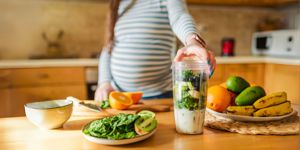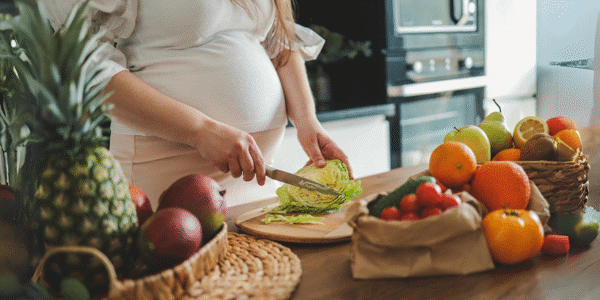Weight gain is often a topic of concern for expectant mothers, and while it's natural to see those numbers on the scale rise during pregnancy, what happens if they don't seem to budge? Fret not; you're not alone, many women struggle to gain weight during pregnancy.
Throughout your pregnancy, weight gain serves as an essential marker of your baby's development and your body's adaptation to growing them.
Typically, you can expect to start to see the scales tip upwards from around the beginning of the second trimester (week 13). This is when the baby begins to grow significantly, and rapidly, and your body starts accumulating additional fluid and fat stores to support both you and your little one.
On average, pregnant women tend to gain between 11 to 16 kg over the course of their pregnancy. But, remember that this is just a general guideline, and individual experiences may vary.
Not gaining enough weight throughout your pregnancy can potentially put you and your baby at greater risk of complications. Keep in mind that gaining weight is essential for your baby’s growth and health, if you are worried about this then consult your healthcare professional.
We asked Sarah Campus, nutrition coach and founder of LDN Mums Fitness, what her top tips are if you’re not gaining weight during pregnancy - here’s what she had to say:
Eat More Often
Try not to skip meals, even if you’re feeling nauseous. Instead of eating three large meals a day, try having six smaller snack-sized bites every two hours or so.
Eating smaller, frequent meals also helps combat morning sickness. If you don’t feel like eating - then perhaps try a thick smoothie adding in flax seeds and oats as this is slow-release energy, perhaps adding in nut butter as well as very good healthy fats and high in protein.
Eat Strategically
Staying hydrated when pregnant is essential - not only from water but also fruits and vegetables can provide water and other nutrients. They provide your baby with folic acid, a vitamin that helps form healthy cells and reduces the risk of birth defects like spina bifida.
However, beverages and calorie-light dishes can reduce your appetite. Instead of starting your meal with a salad or a big glass of water, save the beverages and greens for after your main course.
Eat your meals first before liquids and ensure every meal has a mix of protein, fibre and healthy fats to help keep your blood sugar even. Skip sugary drinks with empty nutritional value and processed and highly refined foods like white bread, cans, and baked goods, and load up on calories that benefit you and your baby (like whole wheat bread, kale and walnuts).
Add Calories to Your Dishes
Try adding an extra tablespoon of olive oil, butter, cream cheese, cottage cheese, sour cream or cheese. Adding these foods to your meals will make you feel fuller but also are very nutritionally beneficial for both you and your baby.
Choose Nutrient-Dense Foods
When it comes to snacks and meals when pregnant focus on high-quality calories filled with protein, bunte and healthy fats. These nutrient-rich foods include:
- Avocados
- Nuts and nut butter
- Fatty fish (like salmon)
- Olive oil
- Beans
- Peas
- Whole grain bread, cereal and pasta
- Oatmeal
- Brown rice
- Lean meat or poultry
- Plain Greek yoghurt
- Dried fruit
- Eggs
- Cheese
Read more: How Can I Eat Healthily During Pregnancy?
Remember, every pregnancy is unique, and weight gain can vary widely among women.
If you're not gaining weight as expected, it's important not to panic. Maintain a balanced diet, stay active, and monitor your health.
However, if you're feeling concerned or unsure about your weight gain, don't hesitate to reach out to your midwife or healthcare provider. They are there to support you throughout your pregnancy journey and can offer personalised advice and reassurance tailored to your individual needs. Your well-being and the health of your baby are their top priorities.






